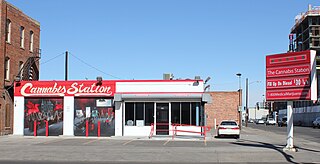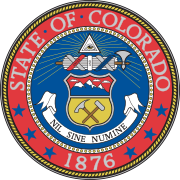
The Marijuana Policy Project (MPP) is the largest organization working solely on marijuana policy reform in the United States in terms of its budget, number of members, and staff. Its stated aims are to: (1) increase public support for non-punitive, non-coercive marijuana policies; (2) identify and activate supporters of non-punitive, non-coercive marijuana policies; (3) change state laws to reduce or eliminate penalties for the medical and non-medical use of marijuana; and (4) gain influence in Congress. MPP advocates taxing and regulating the possession and sale of marijuana in a manner similar to alcohol, envisions a nation where marijuana education is honest and realistic, and believes treatment for problem marijuana users should be non-coercive and geared toward reducing harm.

In the United States, the non-medical use of cannabis is decriminalized in 16 states, and legalized in another 11 states, as of April 2020. Decriminalization refers to a policy of reduced penalties for cannabis offenses, typically involving a civil penalty for possession of small amounts, instead of criminal prosecution or the threat of arrest. In jurisdictions without any penalties the policy is referred to as legalization, although the term decriminalization is sometimes broadly used for this purpose as well.

The legal history of cannabis in the United States pertains to the regulation of cannabis for medical, recreational, and industrial purposes in the United States. Increased restrictions and labeling of cannabis as a poison began in many states from 1906 onward, and outright prohibitions began in the 1920s. By the mid-1930s cannabis was regulated as a drug in every state, including 35 states that adopted the Uniform State Narcotic Drug Act. The first national regulation was the Marihuana Tax Act of 1937.

The Sensible Marijuana Policy Initiative, also known as Massachusetts Ballot Question 2, was an initiated state statute that replaced prior criminal penalties with new civil penalties on adults possessing an ounce or less of marijuana. The initiative appeared on the November 4, 2008, ballot in Massachusetts.

Cannabis in Oregon is legal for both medical and recreational use. In recent decades, the U.S. state of Oregon has had a number of legislative, legal, and cultural events surrounding use of cannabis. Oregon was the first state to decriminalize the possession of small amounts of cannabis, and among the first to authorize its use for medical purposes. An attempt to recriminalize possession of small amounts of cannabis was turned down by Oregon voters in 1997.

Cannabis in Colorado refers to cannabis use and possession in the state of Colorado. The Colorado Amendment 64, which was passed by voters on November 6, 2012, led to legalization in January 2014. The policy has led to cannabis tourism. There are two sets of policies in Colorado relating to cannabis use: those for medicinal cannabis and for recreational drug use along with a third set of rules governing hemp.

California Proposition 19 was a ballot initiative on the November 2, 2010 statewide ballot. It was defeated, with 53.5% of California voters voting "No" and 46.5% voting "Yes." If passed, it would have legalized various marijuana-related activities, allowed local governments to regulate these activities, permitted local governments to impose and collect marijuana-related fees and taxes, and authorized various criminal and civil penalties. In March 2010, it qualified to be on the November statewide ballot. The proposition required a simple majority in order to pass, and would have taken effect the day after the election. Yes on 19 was the official advocacy group for the initiative and California Public Safety Institute: No On Proposition 19 was the official opposition group.

In the United States, the use and possession of cannabis is illegal under federal law for any purpose, by way of the Controlled Substances Act of 1970. Under the CSA, cannabis is classified as a Schedule I substance, determined to have a high potential for abuse and no accepted medical use – thereby prohibiting even medical use of the drug. At the state level, however, policies regarding the medical and recreational use of cannabis vary greatly, and in many states conflict significantly with federal law.

The legal history of cannabis in the United States began with state-level prohibition in the early 20th century, with the first major federal limitations occurring in 1937. Starting with Oregon in 1973, individual states began to liberalize cannabis laws through decriminalization. In 1996, California became the first state to legalize medical cannabis, sparking a trend that spread to a majority of states by 2016. In 2012, Colorado and Washington became the first states to legalize cannabis for recreational use.

Cannabis in Massachusetts relates to the legal and cultural events surrounding the use of cannabis. A century after becoming the first U.S. state to criminalize recreational cannabis, Massachusetts voters elected to legalize it in 2016.
Cannabis in South Dakota is illegal for all purposes, and possession of any amount is a criminal offense. South Dakota is the only U.S. state which outlaws ingestion of controlled substances. Testing positive for cannabis can be a misdemeanor offense.
Cannabis in Kansas refers to the drug cannabis in Kansas, United States, where it is illegal for all purposes, and possession of even small amounts is a misdemeanor crime. Cannabis is only legal in Kansas in the form of a THC free cannabidiol oil, also known as CBD.
In the United States Virgin Islands, recreational use of cannabis is illegal but possession of under one ounce is decriminalized. Medical use was legalized in 2019 through a bill that passed the Senate 9–4.

Amendment 20 was an amendment to state statutes, submitted for referendum in the 2000 general elections in the U.S. state of Colorado. The amendment was adopted by 54% of participating voters. Under the law, patients may possess up to 2 ounces of medicinal marijuana and may cultivate no more than six marijuana plants at a time. Patients who are caught with more than this in their possession may argue "affirmative defense of medical necessity" but are not protected under state law with the rights of those who stay within the guidelines set forth by the state.[4]

Cannabis in Nevada became legal for recreational use effective January 1, 2017, having been legalized by ballot initiative in 2016. Medical marijuana use was legalized by ballot initiative in 2000, and has been available to licensed individuals in the state since shortly after that date. Nevada also licenses growers and distributors, and citizens of Nevada are banned from growing their own cannabis unless they live more than 25 miles from a licensed dispensary.
Cannabis in Missouri is illegal but decriminalized. Medical use was legalized in 2018 through a ballot initiative to amend the state constitution.
Cannabis in New Mexico is illegal for recreational use, but decriminalization went into effect in July 2019. A bill to legalize recreational use passed the House in March 2019.
Cannabis in New Hampshire is illegal for recreational use and is decriminalized for possession of up to three-quarters of an ounce as of July 18, 2017. It is permitted for medical use.
Cannabis in Ohio is illegal for recreational use. Since 1975 possession of up to 100 grams has been decriminalized, however. Several of the state's major cities have also enacted further reforms.

In Washington, D.C., cannabis is legal for recreational and medical uses, but is barred from commercial sale. Though the drug was fully legalized in the District following a 2014 ballot referendum, the United States Congress exercises oversight over the government of the District of Columbia, preventing the local government from regulating cannabis sales like other jurisdictions with authority derived from a U.S. state.











